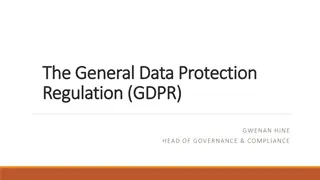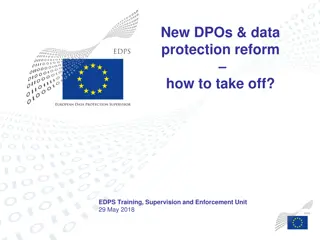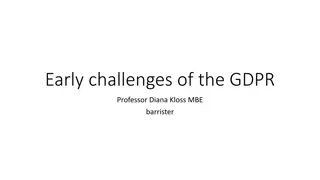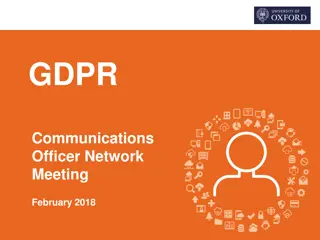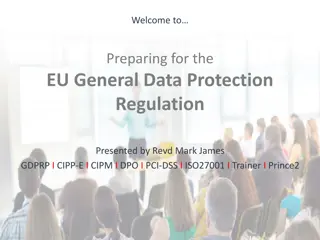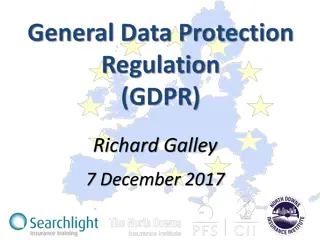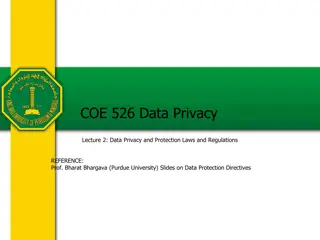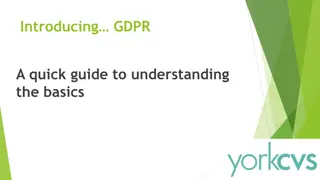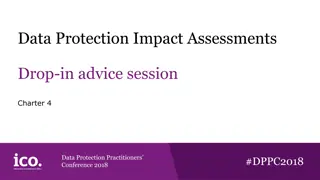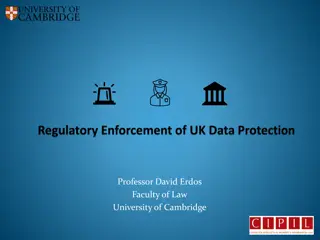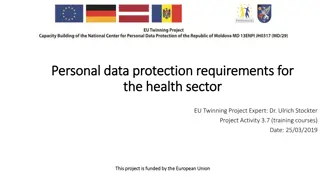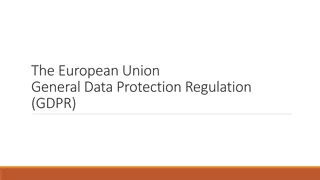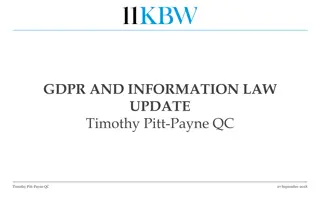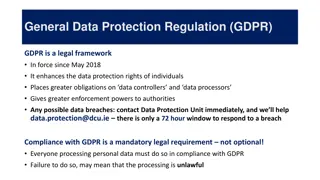Understanding the EU General Data Protection Regulation (EU GDPR)
The EU General Data Protection Regulation (EU GDPR) is a comprehensive regulation that governs the processing of personal data of individuals in the EU. It came into effect on May 25, 2018, and applies to all organizations handling personal data of EU residents. The regulation includes key definitions such as processing, personal data, and data subjects, and imposes strict guidelines on the collection, storage, and processing of sensitive personal data. Understanding the EU GDPR is crucial for compliance and data protection.
Download Presentation

Please find below an Image/Link to download the presentation.
The content on the website is provided AS IS for your information and personal use only. It may not be sold, licensed, or shared on other websites without obtaining consent from the author. Download presentation by click this link. If you encounter any issues during the download, it is possible that the publisher has removed the file from their server.
E N D
Presentation Transcript
The EU General Data Protection Regulation An Overview
What is it? Regulation (EU) 2016/679 of the European Parliament and of the Council of 27 April 2016 on the protection of natural persons with regard to the processing of personal data and on the free movement of such data, and repealing Directive 95/46/EC (General Data Protection Regulation) aka The EU General Data Protection Regulation or EU GDPR Find the full text of the GDPR at: http://eur-lex.europa.eu/legal- content/EN/TXT/PDF/?uri=CELEX:32016R0679&from=EN (note the first 31 pages are a preamble)
Scope and Timeline The EU GDPR goes into effect May 25, 2018
Scope and Timeline The EU GDPR covers: Processing* of personal data* of data subjects* who are in the EU*, where either Processing is performed by controller or processor of the data in the context of activities of an establishment in the EU The EU activities/establishment need not be primary place of business for controller/processor Data need not be processed in the EU E.g. U.S. Universities with branch campus, study center, research facility in the EU or Controller or processor is not established in the EU but processing activities relate to Offering of goods or services to data subjects in the EU or Monitoring of data subjects behavior as far as the behavior takes place within the EU E.g. Study, internships, or research by students/faculty in EU, admissions for EU-based students, research incorporating EU datasets, distance learning for EU-based students
Scope and Timeline: Key Definitions Processing: ANY operations performed on personal data, including Collection Recording Storage Consultation Organization Erasure Personal Data: relating to an identified or identifiable natural person Fully anonymized data IS NOT subject to the EU GDPR Pseudonymized data (attribution to a specific person requires additional information) IS subject to EU GDPR Sensitive personal data (race/ethnicity/ political views, religious beliefs, genetics, biometrics health, sexual activity or orientation, criminal record) is subject to more stringent regulation under EU GDPR
Scope and Timeline: Key Definitions Data Subjects: identified or identifiable natural persons Students Faculty Staff Third parties (contractors, donors, alumni) In the EU: located or residing in the EU. Not limited by nationality or permanent legal residency status.
Consequences of Failure to Comply Very substantial fines, up to 4% of total worldwide annual turnover or 20 million, whichever is higher Enforcement may be judicial or by supervisory authorities set up in Member States
(Relevant) Lawful Bases for Processing With consent of the data subject Necessary for performance of a contract Necessary for legitimate interest of controller/processor Necessary to protect vital interests of data subject or other natural person(s) (i.e., risk to life or safety) Necessary for compliance with EU or Member State law* *this does not include compliance with U.S. or Maryland law
Lawful Basis for Processing: Consent Consent must be freely given, specific, informed and unambiguous Consent is revocable at any time (but not retroactively!) Cannot be combined with another basis for processing Minors (<16; member countries may set lower limit) cannot consent Processor/Controller must be able to demonstrate consent was obtained Official guidance on consent can be found at: http://ec.europa.eu/newsroom/article29/item-detail.cfm?item_id=623051
Lawful Basis for Processing: Necessary for Performance of a Contract Potentially applicable to some common university activities Payroll processing Third party contractors Distance learning in EU Admissions Study abroad
Lawful Basis for Processing: Legitimate Interest Identify the legitimate interest in advance Should be lawful, specific, and not speculative Examples: enforcement of legal claims, fraud prevention, research Processing must be necessary for that interest Weigh interest against fundamental rights and freedoms of data subject Strength of interest vs. impact on data subjects Proportionality of transparency and measures to protect rights Broader public interest is relevant (charitable, scientific, anti-fraud) Reasonable expectations of data subject are also taken into account
Lawful Basis for Processing: Legitimate Interest Potentially applicable to: EU campuses, affiliates, and programs Study abroad Alumni Relations Distance learning Websites Research Procurement
Rights of the Data Subject Transparency Access to Personal Data Rectification of Personal Data Erasure of Personal Data ( right to be forgotten ) Restriction of Processing Data Portability Objection to Individual Decision-making by Algorithm/Profiling (incl. direct marketing)
Transparency Privacy Notice must be provided to data subject Detailed requirements can be found at GDPR Articles 13 & 14 Clear and plain language, concise A couple of potential pitfalls: Where data isn t obtained from the data subject, notice must be given within 1 month, or at the time of first communication with the data subject Further processing of data beyond originally disclosed purposes triggers new notice obligation
Right to Erasure Right to request erasure of personal data Applies in limited circumstances When lawful processing is complete or was not present to begin with, e.g. Research or relationship is concluded Withdrawn consent Subject objects to legitimate ground and balance is held to be in favor of subject Data subject is a minor Exception for archiving purposes in the public interest, scientific or historical research purposes or statistical purposes See more at GDPR Article 17
Compliance Strategy Identify impacted offices/units and gather information about activities Study abroad Admissions/International admissions Distance learning Alumni Relations & Development IT Researchers/research units acting overseas or using overseas datasets Revise privacy policies and notices per Articles 13 & 14; develop GDPR-compliant consent form for use as needed, consider whether you need a specialized consent form for sensitive information such as ethnicity and sexual orientation See Article 9
Compliance Strategy, contd Determine and document bases for processing; note that processing includes storage. Appoint an EU based representative unless processing is occasional, small scale, doesn t involve sensitive data, isn t likely to risk rights and freedoms - see Article 27. Analyze need to appoint a data protection officer as well, if processing is large-scale see Article 37. Establish policy mandating recordkeeping of processing activities per Article 30 for any data that is covered by GDPR If you appoint an EU representative, that person must also maintain records of processing activities.
Thank you! Jennifer DeRose jderose@oag.state.md.us 410-576-6318



